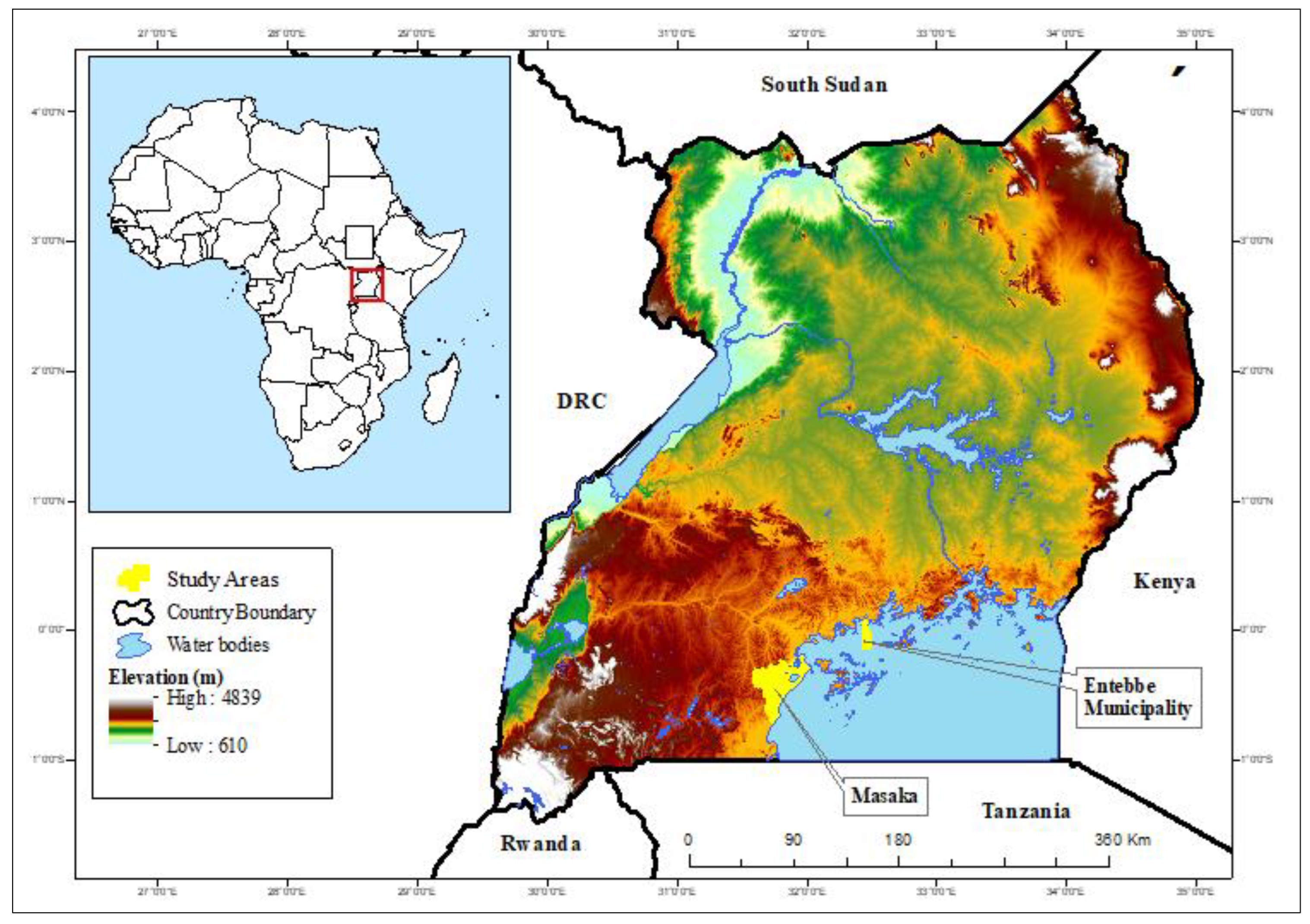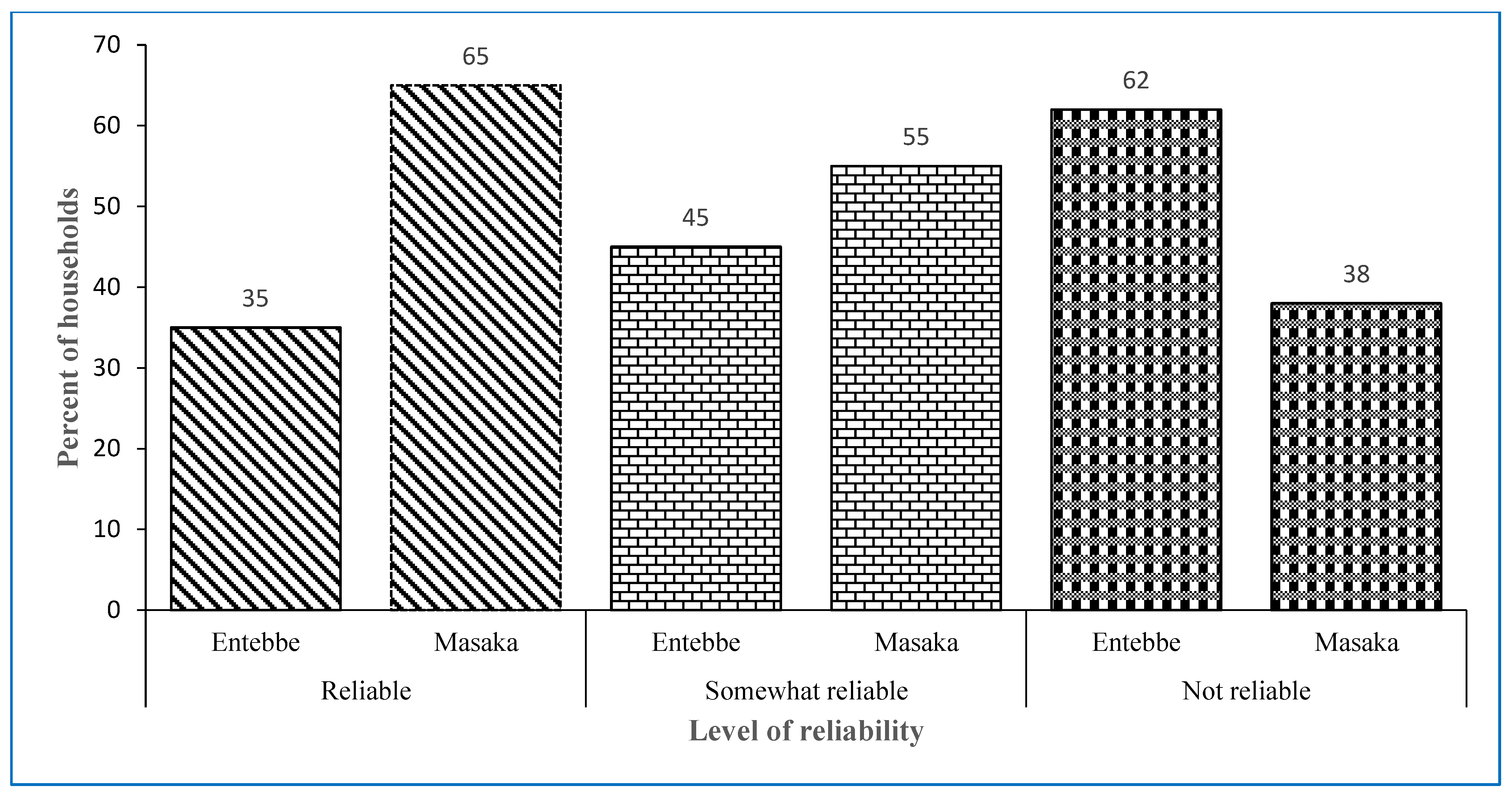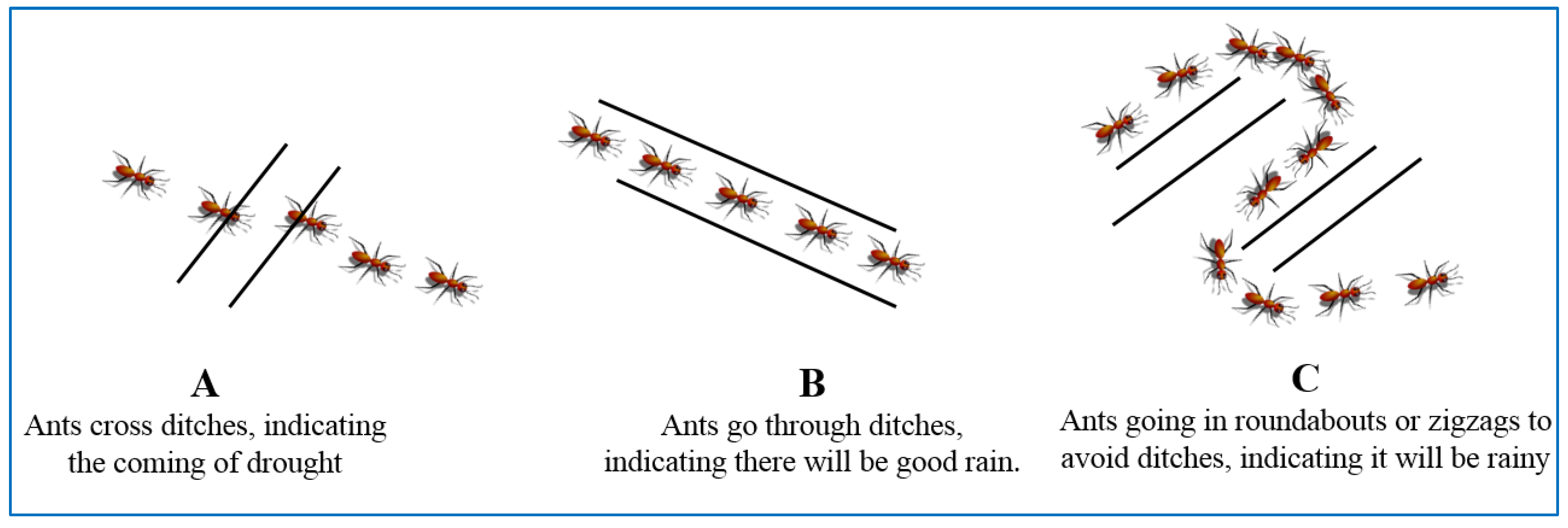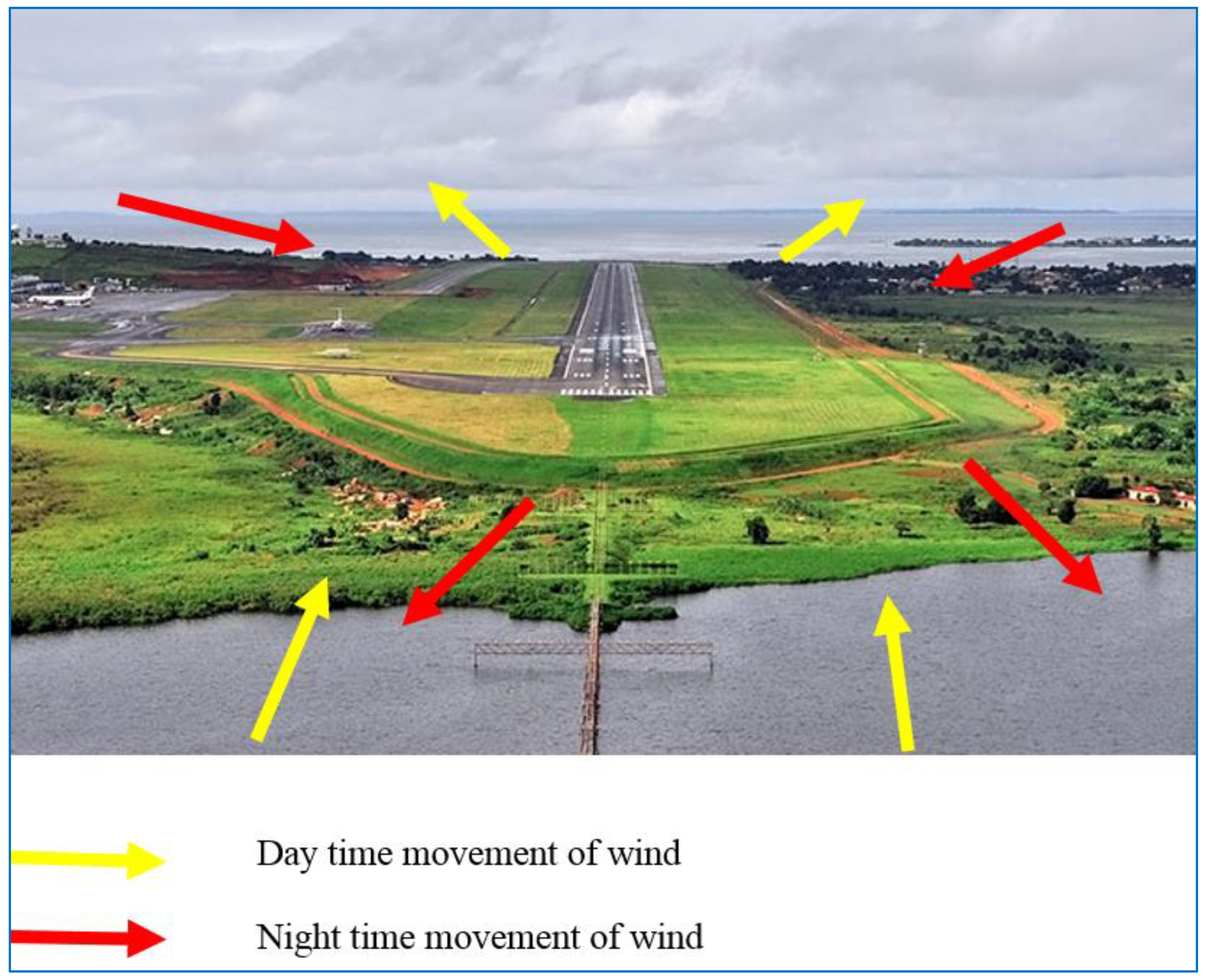1. Introduction
Since human existence, indigenous knowledge systems (IKSs) for instance; observing the behavior of large animals, birds, plants, insects, and the solar system have been used by different societies the world over for various purposes (Balehegn et al., 2019; Okonya et al.,2013). Knowledge about past weather and climate events in various parts of the world has been accumulated through personal and group experiences that have been handed down to generations through oral traditions. The vast population dynamics in Eastern Africa, depend on agriculture and pastoralism which are too vulnerable to climate and weather extremes. The need for reliable weather and climate information services which are location-specific is thus important to support decision-making processes within East African communities (Radeny et al., 2019).
According to (Radeny et al., 2019), East African weather and climate agencies, still grapple with the provision of precise, location-specific, timely, and user-friendly weather and seasonal climate forecast information that effectively addresses the needs of farmers and pastoralists. Additionally, scientific weather and climate forecasts are often provided to the local communities in a generalised format which become less effective for small community-level decisions and more so difficult for farmers and pastoralists to access them to make farming and livestock production decisions. The prevailing problems associated with scientific weather and climate services, therefore force local communities to rely on indigenous knowledge (IK) for seasonal weather observations, where local-observed indicators and experiences are used to observe, forecast, and interpret local weather conditions and climate (Nganzi et al.,2015; Komutunga et al.,2013).
Indigenous knowledge has been defined as institutionalized local place-based knowledge rooted in local cultures and has been built upon and often passed on across generations through oral history (Radeny et al., 2019; Egeru, 2012; Orlove et al., 2010; Ladislaus et al., 2010; Luseno et al., 2003). However, this rich knowledge (IKSs),throughout the global is given less attention and thus neither recorded nor documented and updated for future generational uses (Radeny et al.,2019; Nganzi et al.,2015).
In Uganda, National Meteorological Authority (UNMA) has progressively improved in the provision of weather and climate services to various users, however, significant gaps with regard to location-specific weather and climatic events still exist. Like in many developing countries, Uganda is still grappling with scanty weather stations and expensive weather instruments which sometimes break down at crucial moment. Since weather is natural in “making”, integrating indigenous knowledge systems into modern weather observational systems will not only improve weather and climate services in Uganda but will greatly lead to nature conservation.
Therefore, the current study aims at assessing the efficacy of integrating indigenous knowledge systems into modern weather observational instruments in order to boost and act as a backup mechanism for modern weather observational instruments to increase accuracy and wide coverage of weather observations within Uganda.
2. Methods
We use data from two pilot case studies (Entebbe Municipality and Masaka district) (
Figure 1).These sites represent diverse usage of climate and weather information services for different activities. Given restricted mobility due to COVID-19 pandemic, the study employed mixed research methods. Data was collected in 2021 through structured household questionnaires and semi structured interviews with senior citizens and some few personnel from Uganda National Meteorological Authority (UNMA) and other key sectors. 50 households (30 from Masaka district and 20 from Entebbe Municipality) were randomly selected, and information collected from the surveys included demographic characteristics, source, and types of and access to weather information, characteristics of the IK indicators, and perception on reliability of IK. Additional information collected from the households surveys included whether households use IK to make local daily decisions. The study adopted the sampling methods as described in detailed Mubiru et al. (2015) study.
3. Results and discussion
3.1. Demographic characteristics of household
Out of 50 households interviewed across the two pilot sites, 90% households were male headed with average age of 46 years, however, there was significant variations in other demographic characteristics for instance; educational levels and income levels with Entebbe Municipality leading Masaka district in these two characteristics (education and income levels).
3.2. Source and types of weather information
Respondents across the two sites receive various weather information for instance; start of rainfall season, expected distribution and rainfall amounts, cropping season length, and end of rainfall season. These various weather and climate information are issued and provided by Uganda National Meteorological Authority (UNMA). Given the fact that the respondents receive weather information, there is still a need for more detailed and location-specific information.
Respondents receive weather information from various sources which include: NGOs, media, indigenous sources, relatives, friends, neighbours and village meetings. Results from
Table 1 indicates that majority of the respondents receive weather information from (radio, TV and mobile phones) across the two study sites. It should be noted that majority of the respondents who use indigenous knowledge sources are in Masaka district (15%), given the fact that it’s still associated with the rural settings compared to Entebbe Municipality.
3.3. Indigenous knowledge on weather and climate observations
As revealed previously by various studies within Eastern Africa, for instance (Radeny et al., 2019; Nganzi et al., 2015; Egeru, 2012; Orlove et al., 2010; Ladislaus et al., 2010; Luseno et al., 2003), in this study, respondents across the two pilot sites use a combination of plants, animals, insects, human behaviours, meteorological and astrological indicators to observe and predict local prevailing weather conditions (
Table 2).
3.4. Reliability and use of Indigenous knowledge to make weather observation
Results from
Figure 2 show the perceived reliability of the use of indigenous knowledge to observe weather and climatic events in Entebbe Municipality and Masaka district. Majority of the respondents particularly in Masaka district (65% and 55%) for reliable and somewhat reliable respectively, believed that the use of indigenous knowledge to observe weather and climatic events is very reliable compared to their counterparts in Entebbe Municipality. This is due to the rural setting of Masaka district which is perceived to preserve indigenous knowledge indicators. Furthermore, the ant-route experiment as carried out by (Balehegn et al., 2019), proved consistency, reliability and usage of indigenous knowledge for purposes of observing weather and climate events in Masaka area (
Figure 3) and the wind pattern algorithm as described by the weather observer at Entebbe International Airport (
Figure 4). The hypothetical wind pattern is often used to provide wind information to Entebbe International Airport during weather instrument failure.
4. Conclusions
Scientific weather and climate observations provided by national meteorological agencies are usually downscaled on coarse scales and they provide generalized weather and climate information. This makes them less effective in solving the needs of the local communities. However, indigenous knowledge which is usually location specific fills this gap and aid in making important day-today activities.The current study assessed the efficacy of integrating indigenous knowledge systems into modern weather observational instruments in order to boost and act as a backup mechanism for modern weather observational instruments to increase accuracy and wide coverage of weather observations within Uganda.The results show that local people across the two study sites use a combination of various indigenous knowledge indicators to observe weather and climate conditions in their communities. This implies that indigenous knowledge plays a critical role in supporting local and area specific efforts of observing weather and climate and its integration in modern scientific weather observations is thus an issue of national and international importance.
Unfortunately, given the vital role of indigenous knowledge in modern weather observation and forecasting, challenges like poor knowledge transfer, limited documentation, loss of biodiversity and influence of religion and modern science tend to undermine the value of indigenous knowledge. To limit these challenges, the study recommends the documentation of the indigenous knowledge system and identify holistic ways of integrating these knowledge into scientific weather observation and forecasting. This will enable the formation of a system that benefits both from the local relevance of indigenous techniques and the increased accuracy and efficiency of modern weather observation techniques. Additionally, it is believed that the integration will boost and act as a backup mechanism for modern weather observational instruments which will increase accuracy and wide coverage of weather observations within Uganda.
Author Contributions
Conceptualization, H.N. and P.W.; methodology, P.W. and H.N; formal analysis, P.W.; investigation, H.N.; data curation, H.N. and P.W; writing— original draft preparation, H.N. and P.W; writing—review and editing, H.N., P.W. and E.N; visualization, P.W.; supervision, E.N.
Funding
This study received no external funding.
Informed Consent Statement
Informed consent was obtained from all subjects involved in the study.
Data Availability Statement
The data used in this study can be freely accessed or otherwise, contacts can be made to the corresponding author.
Acknowledgments
This study emanates from WMO Technical Conference on Meteorological and Environmental Instruments and Methods of Observation (TECO-2022) held in Paris-France, October, and the authors are highly thankful to all primary and secondary data providers.
Conflicts of Interest
The authors declare no potential conflict of interest.
References
- Balehegn, M., Balehey, S., Fu, C., & Liang, W. (2019). Indigenous weather and climate forecasting knowledge among Afar pastoralists of north eastern Ethiopia: Role in adaptation to weather and climate variability. Pastoralism, 9(1), 1-14. [CrossRef]
- Egeru, A. (2012). Role of indigenous knowledge in climate change adaptation: A case study of the Teso Sub-Region, Eastern Uganda.
- Komutunga E. Nowakunda, K. Bamanya, D.(2013).Indigenous knowledge in weather forecasting in Kaabong and Soroti districts. Final Report, November 2013. National Agricultural Research Organization (NARO).
- Ladislaus, B. C. A., Pius, Z. Y., & James, N. (2010). Indigenous knowledge in seasonal rainfall prediction in Tanzania: A case of the South-western Highland of Tanzania. Journal of Geography and Regional Planning, 3(4), 66-72.
- Luseno, W. K., McPeak, J. G., Barrett, C. B., Little, P. D., & Gebru, G. (2003). Assessing the value of climate forecast information for pastoralists: Evidence from Southern Ethiopia and Northern Kenya. World development, 31(9), 1477-1494. [CrossRef]
- Mubiru, D. N., Kyazze, F. B., Radeny, M. A., Zziwa, A., Lwasa, J., & Kinyangi, J. (2015). Climatic trends, risk perceptions and coping strategies of smallholder farmers in rural Uganda. CCAFS Working Paper.
- Okonya, J. S., & Kroschel, J. (2013). Indigenous knowledge of seasonal weather forecasting: A case study in six regions of Uganda. Agricultural Sciences, 2013. [CrossRef]
- Orlove, B., Roncoli, C., Kabugo, M., & Majugu, A. (2010). Indigenous climate knowledge in southern Uganda: the multiple components of a dynamic regional system. Climatic change, 100(2), 243-265. [CrossRef]
- Radeny, M., Desalegn, A., Mubiru, D., Kyazze, F., Mahoo, H., Recha, J., & Solomon, D. (2019). Indigenous knowledge for seasonal weather and climate forecasting across East Africa. Climatic Change, 156(4), 509-526. [CrossRef]
|
Disclaimer/Publisher’s Note: The statements, opinions and data contained in all publications are solely those of the individual author(s) and contributor(s) and not of MDPI and/or the editor(s). MDPI and/or the editor(s) disclaim responsibility for any injury to people or property resulting from any ideas, methods, instructions or products referred to in the content. |
© 2023 by the authors. Licensee MDPI, Basel, Switzerland. This article is an open access article distributed under the terms and conditions of the Creative Commons Attribution (CC BY) license (http://creativecommons.org/licenses/by/4.0/).








